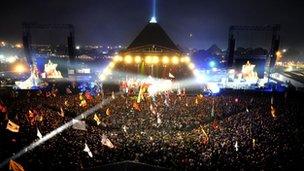BBC plans to launch BBC One +1
- Published
- comments

Strictly Come Dancing is one of BBC One's most-watched programmes
The BBC is planning to launch a BBC One +1 channel, its director general Tony Hall has announced.
Speaking at his first major speech since joining in April, Lord Hall said audiences expected a timeshift service that would give people "more of what they've already paid for".
Other innovations he announced included a revamped, personalised iPlayer, offering a 30-day catch-up period.
The service will also allow users to watch shows before they are broadcast.
Explaining the decision to introduce a "plus one" service, which would show BBC One programmes with a one-hour time delay, Lord Hall said: "BBC One needs to be on top form. It has to be the nation's favourite channel, and also its bravest."
He added the corporation would be investing more in drama and entertainment "so that all audiences find something they love on the BBC".
In addition, a BBC Store will be launched, offering people in the UK the chance to buy BBC shows to watch and keep.
Lord Hall said he wanted BBC Music to be a well-recognised brand like BBC News and BBC Sport, and that he wanted to offer more moments like this year's Glastonbury festival coverage, where six stages were streamed live to TV, radio, computers, consoles, tablets and phones.
Plans for the new-look iPlayer are unveiled
"Our audiences loved it. I loved it. I watched on my phone. Glastonbury reached more viewers and listeners on that one weekend than had attended the festival in its entire 40-year history," he said.
He also announced a new product - BBC Playlister - which will allow audiences to tag any piece of music they hear on the BBC and listen to it later, via streaming services like Spotify, YouTube and Deezer.
The director general promised the corporation would have a closer relationship with its audience in future, treating them as "owners" rather than licence fee payers.
A "personalised BBC" will allow viewers to rate and discuss programmes, and that "will influence what we commission," he said.
"People should not be saying 'the BBC', but 'my BBC', 'our BBC'," he added.
"Audiences demand to be involved and expect to participate. In future they will talk to us and we will listen."
In a wide-ranging speech, Lord Hall announced the following innovations, although he noted the biggest changes would have to be submitted to the BBC Trust for approval:

This year's Glastonbury Festival was streamed on television, the Red Button and tablet services
The next generation BBC iPlayer, which will allow a "more bespoke" experience for every user. There will be a 30-day catch-up window, subject to approval.
Marking the 400th anniversary of Shakespeare's death in 2016, the BBC will fully digitise its Shakespeare archive, making it available for free to those in education and learning in the UK where rights allow.
The corporation aims to double the BBC's global news audience from 250 million users a week to 500 million by 2022.
BBC Playlister, a new digital service that will allow listeners to pick and tag any piece of music they hear on the BBC and listen to it later. The corporation is working with streaming services so that listeners can keep all their favourite music in one place, listening to it across whatever devices they have.
BBC Store, which will offer people in the UK the chance to buy, watch, and keep a selection of BBC programmes.
An extra 20% investment in arts programming, which will include a major new strand 'BBC Arts at…' that will showcase live performances from around the country. It will also relaunch The Space - the BBC's partnership with Arts Council England.
Open Minds, which will be a selection of carefully chosen packages featuring highlights from Radio 3, Radio 4 and The World Service.
Digital Creativity and Coding - a project to teach people how to programme computers, smartphones and a whole range of digital devices, due in 2015.
Building on its experience of covering the Olympics, the BBC will deliver live experiences to audiences made up of the best video, audio, text and statistics, across four screens - TV, computer, mobile and tablet.
Lord Hall said that, while the BBC was continuing to make savings following the licence fee freeze, his plans would require "another £100m a year" - which the BBC will have to find by redirecting "resources, money [and] people".
Director General Tony Hall : "A step into new territory"
He also praised the strength of BBC News, saying: "While I want BBC News to be alive to its critics, I don't want BBC News to be cowed by them."
"We are going to show the British public, who pay for this service, that we know - and will never again forget - what we are here to do.
"The people of this country make a bold and generous commitment in paying for the BBC. They own it, they love it, and they expect only the best from it. Every day we are going to show that we are worthy of that commitment."
Lord Hall acknowledged his vision for the BBC came under the shadow of recent scandals including those involving Jimmy Savile and senior manager pay-offs.
"No organisation as big as ours can avoid making mistakes. But I want to ensure that when we do make mistakes they are caused by trying to serve our viewers, not by looking after ourselves.
"And when we do make mistakes - and we will - let's own up to them quickly, learn from them, and move on."
'Really, really tough time'
He later told BBC Radio 4's World at One he "wouldn't consider closing a channel" to help free up cash for the rest of the network, adding: "I think people know that the public feel very strongly about all the services that the BBC does."
He also said he had not been in contact with any former senior BBC figures to ask them to return portions of their payoffs.
The BBC has been criticised for paying £25m to 150 outgoing executives - £2m more than their contracts stipulated - between 2009 and 2012.
"I feel that the payoffs were things agreed by the BBC for those people but, look, I acknowledged in what I said this morning - this organisation has been through a really, really tough time," Lord Hall said.
"When I go round the organisation, when I speak to people outside, I know how people feel, that the organisation has not been the organisation they wanted."
- Published8 October 2013
- Published7 October 2013
- Published8 October 2013